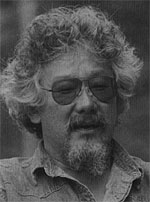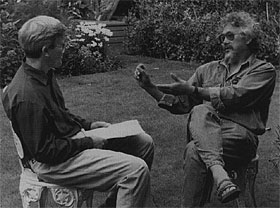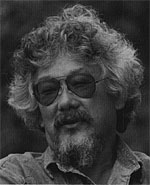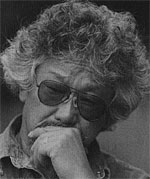Interview: David Suzuki

When I passed through Canadian customs at the Vancouver airport on my way to conduct this interview, the officer inquired about the nature of my business. I said that I had an appointment to interview David Suzuki. "Oh," the officer said, "everyone in Canada knows David Suzuki!" Dr. Suzuki, professor of genetics at the University of British Columbia, is the host of "The Nature of Things," one of the most popular programs on Canadian television. He is also the author or coauthor of numerous research articles and books, including the leading genetics textbook, An Introduction to Genetic Analysis (Freeman, 1989), and Genethics: The Ethics of Engineering Life (Harvard University Press, 1989). In this interview, Professor Suzuki discusses the special responsibilities of research scientists and science educators.
How did your interest in biology and genetics evolve?
My father was the greatest inspiration and role model for me. It began right from my earliest memories, which were basically of camping and fishing. My father was never interested in material success, and he was regarded as a bit of a dreamer by his father. But he certainly inspired my great love of nature. When I was about 9, my mother made me a butterfly net out of mosquito netting and I started an insect collection, which was a big hobby of mine for years and years.
But my great love of nature came from fishing, and I wanted to be an ichthyologist. I met a man from the Royal Ontario Museum who was one of the great naturalists on staff there. He told me, "Look, this is a great hobby to have, but for God's sake don't go into it to make a living." I often think about him. Here was a man who had what I thought was one of the greatest jobs in the world, a curator in a museum, and he was discouraging me, advising me instead to go into medicine or something to make a living. That was very sad. I always tell young people to go where their heart leads because they'll be doing it for a long time.
I went to Amherst College and basically I was a pre-med, but in my third year I took genetics because all honors students had to. Once I encountered genetics as an incredibly precise, elegant way of looking at the world, I fell madly in love with it. I guess working with fruit flies was an immediate joy because I'd always loved insects as a child.
You've written about how your experience teaching undergraduates influenced your own development. Can you give an example?
With introductory classes, not a year goes by when a student doesn't ask me a question about something I've never thought of before. It really brings you up short. You realize that students come in without all of the prejudices and all of the preconceptions, so they can ask a question that really makes you look at things in a different way.
The story of Martin Greenall is especially instructive. Martin was probably the best student I ever had in genetics at the University of British Columbia. He had organized evening seminars for interested students, and he asked if I would come and talk about the prospects of genetic engineering. It was very easy back in the sixties. You could talk about cloning and all of this science fiction stuff and the students' eyes would pop open and they were very impressed. But at the end of it, Martin got up and said, "Well, you're so concerned about the misapplication of science, and you know about the history of Nazism and so on. The fact is that genetics hasn't had a great track record. So how do you justify continuing to work in an area that has a high probability of being misused?"
I gave him a glib answer: "I'm just working with fruit flies; I have nothing to do with the application of science. I'm just looking for truth." Which is the answer that is generally given by most of my colleagues. And Martin just kept right on, and he said, "Look, think of knowledge as a lake, a body of information, and everyone contributes to that lake of knowledge, so its level rises. You can't tell whether you, Suzuki, studying genetic recombination in fruit flies, might contribute something to that body of knowledge that someone might draw on to apply. You can't escape responsibility by saying, 'Well, I'm just searching for truth.' What you are doing is adding to the totality of knowledge." That was a very, very profound insight for me. This undergraduate was telling me that there is a greater responsibility that comes simply by participating in the scientific enterprise.
And that experience led to your interest in science ethics?
It touched off a whole questioning in me. I came through university right after the Soviet spacecraft Sputnik went up in 1957. In the years immediately following that event, a wave of fear swept through the western world when we realized that the Soviet Union was very powerful and very advanced in math and science. One result was that the United States set up NASA and began a massive program of training people in science. I received a big scholarship at the University of Chicago. And as graduate students, we were trained to believe that there was nothing beyond the inquiring mind of science. That the potential benefits of science were enormous. I believed it, and that's what I taught my students. It was only when Martin asked me about the other side of responsibility that I really had to look back at myself. It's one thing to look at cloning human beings and say, "Oh no, that's dangerous." But then to ask yourself, What responsibility do I bear as a fruit fly geneticist?... That began a long period of introspective questioning.
But my transformation really began when I started seriously doing television programs for a national audience in the mid-sixties. I got started in TV to raise the public awareness and support of science, because science in Canada has traditionally been very poorly funded. I thought that if the public understood why science was important, they would then give more money to the scientific community. But being in a public medium like television, I began to see there was a radically different perspective on science held by nonscientists. They weren't interested in whether or not science was well funded. They were interested in, How is your work going to affect my kids? How will it affect the quality of my life? Is somebody going to make money from what they learn about me? I realized there was a public out there that had a whole set of questions that I as a scientist had to confront. So while Martin raised the issue of my responsibility as a practicing scientist, working in the media opened my mind to a wider set of conditions and questions.

How do your colleagues in science react to your fame as a television celebrity?
When I started my work in television I received a tremendous amount of criticism. You have to remember that this was back in the sixties. I had hair down to my shoulders; I wore a headband. My colleagues were outraged that this "hippie" was speaking as a scientist. And not only speaking as a scientist, but even being critical of the scientific community. Very few of them would ever come and say it to my face. I would hear from my students who would go to parties and end up having to defend me. People have always felt I'm making a great deal of money, but anyone who knows how television is supported in Canada would know that that is not the case. It has always been my concern that I make only as much as I would make at the university. Whatever money I earn over that I use for my causes, which have been civil rights and environmental issues. So, sure, there's a lot of resentment, but since I don't spend much time in the scientific milieu anymore, I don't hear much of it.
Is an idealized view of science common in the general public?
I think there are misconceptions even held by the scientific community. The people practicing science are human beings, and as human beings they show the entire range of human foibles. There are, of course, noble people driven to try to improve the lot for humankind. There are also greedy people, selfish people, the whole range. There's enormous pressure on scientists now, especially in my area of genetics, to reap economic payoffs from biotechnology. All kinds of terrible things can result from economic and political pressure, and the scientific community has to face up to that.
So there's pressure for basic researchers to do research that promises some kind of practical application?
Yes. In Canada, because we have been so starved for funding, the government has enormous power to influence scientific priorities. Say you have a guy studying the basic molecular biology of cell division, and suddenly there is a high priority on doing cancer research. Of course he immediately says, "Oh well, I'm doing work on cancer because I'm looking at the mechanism of how cells divide." And everybody begins to rewrite grant applications this way. The tragedy is that few scientists have gotten up and said, "The very nature of science is that we don't know where our results will lead. If we knew where our research was going to lead, for God's sake, we would have all the solutions by now."
Look at the history of science. I think of Barbara McClintock. When I was at graduate school in the sixties, Barbara McClintock was a very eminent geneticist, a past president of the Genetics Society of America, a member of the National Academy [of Sciences]. We studied her work on jumping genes in corn. We always said, "This is something that is unique to corn and has nothing to do with mainstream genetics. But because she is so eminent we must study this as an example of genetics." Now, 30 years later, her ideas are at the base of much genetic manipulation, and she belatedly won a Nobel Prize. Thirty years ago, nobody had any notion that her work would ever be mainstream. If she had tried to get a grant back then, I doubt that it would have had a high priority.
So it's a sellout of science to say, "Yes, we will do research that is mission oriented or goal oriented. Give us the money and we'll do it." You've got to be led by where your best minds find an interesting problem on the faith, a faith corroborated by history, that good scientists will make discoveries that are ultimately very important and useful.

You mentioned the potential for perversion of science, particularly genetics. Can you give some examples?
All human beings, including scientists, have prejudices that are determined very early by our culture and socioeconomic background. And we're very quick to leap on notions that seem to corroborate our own prejudices. In The Mismeasure of Man, Stephen Jay Gould gives a good example. It was taken for granted earlier in this century that females had an inability to do certain kinds of calculations. It was assumed that the ability to do those calculations resides in certain parts of the brain. And when they looked at that part of the brain, sure enough, the researchers concluded that those parts were smaller in females than males. What Gould did was to go back and reexamine the data, often the very same skulls. He showed that, in fact, there is no statistical difference between parts of the brains of women and men. The prejudices of the earlier researchers were reflected in the gathering and interpretation of the data. Every student should take that very seriously as a lesson.
One of the dangers today is that our students don't get any history of science. That's regarded as a frill. We assume that today's research hotshots are smarter than anybody in the past. We always assume that someone who's dead couldn't possibly have been as smart as we are today. When I was a graduate student in 1961, we thought that DNA was arranged in short pieces about gene size, hooked together by protein linkers in a linear sequence. When I tell my students that, they fall off their chairs laughing because they know that DNA is a single molecule in a chromosome. And I tell them, "You're right; it does seem silly today. Well, you're not going to believe this, but what you think is a hot idea now will make your students fall off their chairs laughing in 20 years." They don't believe me. We don't remember any of the history, and we think what we are getting is truth, which means that we are going to make the same old mistakes.
Look back at the great claims that were made early in the century that fueled the whole eugenics movement. With the rediscovery of Mendel's laws and the study of genetic recombination and mutation, people thought that they really had their hands on the levers of life, that through this powerful science we could come to understand and be able to control human heredity. It was assumed at that time that drunkenness, syphilis, and all those things were hereditary and they could be eliminated.
I hear the same kinds of claims being made again. And with the Human Genome Project, once again there is a sense that virtually every aspect of the human makeup is biologically determined. I find this horrifying because people are finding all kinds of correlations and assuming that correlations show causation.
Just last year, a discovery was announced that there were two alleles of a gene for alcohol dehydrogenase. They showed that 80% of alcoholics have one form of this gene and 80% of nonalcoholics have the other form. That's a correlation. It was immediately assumed by the scientists themselves as well as the popular press that they had found the gene that causes alcoholism. I think that that's a danger we're going to run into again and again. Think about this. Suppose I perform an autopsy on 100 people who died of lung cancer and discover that 90% of them have brown-stained teeth and yellow fingers. That's a correlation. But it would be absolutely wrong to conclude that brown-stained teeth and yellow fingers cause lung cancer. Yet that's exactly what they are doing with this alcohol dehydrogenase allele.
With the Human Genome Project, as we begin to be able to sequence larger and larger amounts of DNA and have a complete profile of DNA fragments, of course we will be able to say, "Let's look at heart disease, let's look at stroke, let's look at various kinds of cancers and show whether we can correlate them with certain patterns of DNA fragments or sequences." I have no doubt that those correlations will be found. Of course the leap from finding a correlation to a cure is a long jump. But I think because we have so much computer power now, we'll start looking for other correlations: with alcoholism, with people on welfare, with criminals. I have no doubt that correlations will be found, and you can be pretty sure that it will be immediately assumed, "This is a causal relationship." Claims of biological determinism will continue to fulfill all of our preconceptions.
Do you see other ethical issues associated with the Human Genome Project?
There is a great deal of interest in what are called ethnic diseases. It arose from the study of sickle cell anemia, Tay–Sachs disease, and cystic fibrosis, which tend to be associated with certain ethnic backgrounds. In principle, it sounds good: If you can show that Tay–Sachs disease is found primarily in Ashkenazi Jews and you can focus prenatal diagnosis on that group, you can avoid terrible hereditary conditions. The problem, of course, is that the information can be used in many other ways. Employers can use it as a reason not to employ people who carry certain genes, for instance. I was particularly struck by an article titled "Ethnic Weapons" in the December 1990 issue of Military Review. The author, Carl Larson, a Swedish human geneticist, pointed out that there are a number of different allelic makeups of ethnic groups. For example, Asians don't make the enzyme that digests milk sugar. So if we consume large quantities of milk, Asians tend to get very sick with diarrhea. That's an ethnic complaint.
What Larson pointed out was that if you could catalog a number of ethnic differences, you should be able to construct a weapon with total ethnic specificity. An ethnic weapon is a very powerful way of selecting your target so you don't kill off your own troops along with the enemy. I don't think that it's just paranoid to think that ethnic weapons are of great interest to the military. If you look at military history, there is nothing that lies beyond the capacity of the military mind to consider using for war, and I think biologists better think very, very seriously about that. Again, it's something that most scientists don't like to face.

Does the potential for gene therapy also raise ethical issues?
There are always ethical issues. My own feeling when we wrote Genethics was that we really ought to have a moratorium on all the experimentation in humans until there has been a very broad public airing of the issues. But the fact is, we're already into gene therapy. It's not hypothetical; it's already being used. They're using it for people with SCIDS, severe combined immunodeficiency syndrome, and I don't doubt that it's going to be used in a number of other hereditary defects. In Genethics, what we said is that we see the coming of somatic cell manipulation, but that there should be an absolute prohibition against manipulating germ cells: gametes and gamete-producing cells. In this way, you confine the effects of manipulation to one generation. When you start manipulating the germ line, then you're talking about passing the consequences on to future generations. And I think we ought to be very careful about that. But today this germ-cell/somatic-cell distinction is being clouded as well.
Do you think there's enough emphasis on such ethical issues in science courses?
Definitely not. It's always regarded as a frill, or if we're forced to, maybe we say a little bit in a couple of lectures. But scientists do it very reluctantly, because there's never enough time in a course to cover even the basic material. I was shocked to discover when I became a professor that I had been taught a history of science that worshipped the hero in science, the bold intellect that makes great discoveries. I had been taught a version of science that simply didn't correlate with the reality of what I saw around me. I think we do a great disservice to our students by perpetuating a mythical idea of what science is like and in keeping them ignorant about the enormous abuses that have resulted from it. Of course, we do society a tremendous disservice as well.
You have argued for what you call a "new mythology" to help resolve the inevitable conflicts between science and human values. What "new mythology" do you envision?
Albert Einstein was asked by a good friend of his, "Do you think that absolutely everything in the universe can be explained through science?" And Einstein's answer was that it could be done, but it would be a meaningless explanation. A physicist could describe a Beethoven symphony accurately as simply variations in wave pressure, but that would tell you nothing about what Beethoven's work really is. What Einstein was saying is that a straight description misses the deeper meaning. If people involved in the Human Genome Project think that by logging the entire 3 billion letters in the genome they are suddenly going to have an understanding of what it is to be human, they are missing the boat. They'll have a set of linear instructions, but that blueprint has to operate in a four-dimensional world, and we know very little about that.
In the late eighties, a group of prominent scientists signed a declaration that says, in effect, that we as scientists have experienced reverence and awe in looking out at the universe and that we must now come to regard the Earth with reverence, as a sacred place to be treated with greater care. To me that was an astonishing document. What these scientists were saying is that without a sense of reverence and awe, science is missing something and invariably becomes destructive. The traditional scientific paradigm is that a scientist looks at objects from a distance. We try to be objective and detached because if we feel an emotional involvement in what we are examining, it colors the way we look at it. The problem with that idea is that by distancing yourself from nature, you no longer care.
This came through to me very strikingly when I was involved in a fight to stop logging on the Queen Charlotte Islands of British Columbia. When we were up there filming, a professor from the Botany Department at the University of British Columbia who had made his world reputation studying a group of plants that are found in the Charlottes and nowhere else ran into the crew.
When he found out what they were doing, he said I had lost all credibility because I was involved in the logging controversy, which is a social issue. He didn't believe I deserve to be called a professor. When I heard that, of course I was mad as hell, but much more strongly, I felt very, very sad. Here was a man who undoubtedly loved those plants—that's why he went into botany—who had made his reputation on these plants, yet he wouldn't lift a finger to save them because he didn't want to sully his credibility. I think that's one of the great problems that we face in science: By virtue of looking at the world from a distance, we no longer have any sense of involvement.
If you look at aboriginal people around the world, they would never think of distancing themselves from nature. They are intimately immersed in their environment, and by being embedded in it, they have come to understand that they are related to all living things. They speak of the frogs and the whales as their brothers and sisters, and they really mean it. And now E.O. Wilson is saying that we must come to know our kin, the other animals and plants with whom we share the world, who are related to us, who share our DNA. I find it interesting that through a sense of total involvement and immersion in the world, aboriginal people have a sense of wonder and awe and kinship with the rest of life that some of the leading ecologists and other scientists are only now beginning to see. We must begin to have greater respect for aboriginal perspectives and realize that these two very different ways of knowing have things to tell each other.
©2005 Pearson Education, Inc., publishing as Benjamin Cummings